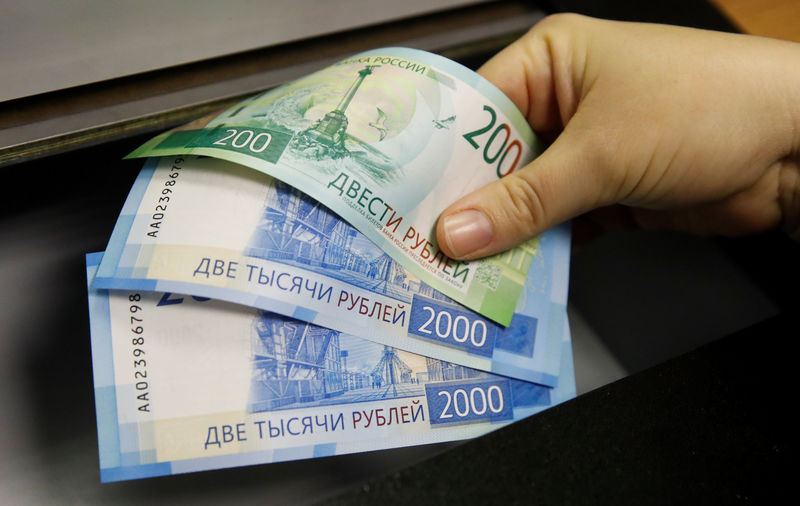 © Reuters. FILE PHOTO: A woman holds new 200 and 2,000 rouble banknotes in a bank in Moscow
© Reuters. FILE PHOTO: A woman holds new 200 and 2,000 rouble banknotes in a bank in MoscowBy Andrey Ostroukh and Polina Nikolskaya
MOSCOW (Reuters) – The Russian rouble sank to its lowest level since June 2016 on Friday on concerns over the impact of new U.S. sanctions and a broadly stronger dollar, with a rout in other emerging markets also weighing on the local currency.
The rouble briefly hit 67.37 against the dollar, after losing around 6 percent of its value since the start of the week on U.S. sanctions fears.
The United States announced new measures on Wednesday targeting Russia that pushed the rouble sharply lower and sparked a wider sell-off over fears Russia was locked in a spiral of never-ending sanctions.
The rouble was briefly supported by central bank data on Friday showing that it bought 8.4 billion roubles ($126 million) worth of foreign currency on Wednesday, the first day of the rouble’s slide, compared with 16.7 billion roubles the previous day.
The central bank said in a statement it may adjust volumes of daily foreign currency purchases to limit the market volatility, calling the rouble’s drop a “natural reaction” to the news about U.S. sanctions.
At 1217 GMT the rouble was 0.59 percent weaker against the dollar at 67.01
“The decision of the central bank was logical for the current market conditions and helped to curb the weakening of the rouble. There are enough buyers of currency, both non-residents and local, anyway,” said Konstantin Kostrub, head of trading operations at ING Commercial Banking in Moscow.
He said he expects the rouble to stabilize around 66.00-67.00 per dollar in the near future.
The rouble was also under pressure from oil prices, which began to fall in the middle of the week before recovering somewhat on Friday as separate U.S. sanctions on Iran look set to tighten supply.
Brent crude oil (), a global benchmark for Russia’s main export, was up 0.76 percent at $72.62 a barrel.
Analysts at Rosbank, a subsidiary of Societe Generale (PA:) in Russia, said in a note that the rouble was affected on Friday more by the situation in emerging markets than by concerns about new sanctions.
The Turkish lira posted its biggest one day fall since the 2001 financial crisis, sending tremors through the emerging markets.
KREMLIN REVENUE PROPOSAL
Russian stock indexes were down, pressured not only by the sanction risks but also by a Kremlin economic aide’s proposal, sent in a letter to President Vladimir Putin, to raise more revenue for the state from metal and mining companies.
The letter, seen by Reuters, lists Evraz (L:), NLMK (MM:), Nornickel (MM:), Severstal (MM:), MMK (MM:), Mechel (MM:), Alrosa (MM:), Polyus (MM:), Phosagro (MM:) and Acron (MM:) among those the state could target.
“Since the weight of these sectors is about 12 percent in the MOEX index, the pressure is noticeable,” analysts at Raiffeisen Capital said in a note.
The dollar-denominated RTS index () was down 1.71 percent to 1,079.43 points, its lowest level since April 11. The rouble-based MOEX Russian index () was 0.61 percent lower at 2,295.52 points.
Putin agreed that a proposal to prop up the budget by raising more revenue from metals and mining companies should be discussed, but has not made any decision, Kremlin spokesman Dmitry Peskov said.
Shares of Polyus fell 6.25 percent, Alrosa fell 4.51 percent, NLMK was down 4.11 percent, MMK has lost 4.25 percent, Severstal lost 2.75 percent and Nornickel was down by 2.67 percent.
“Until additional explanations on the potential measures are announced, investors will prefer to refrain from buying metals and mining stocks,” analysts at Raiffeisen Capital said.
Source: Investing.com





























